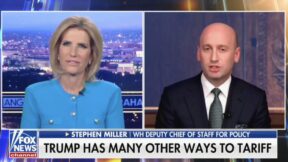Axios’ Barak Ravid on Israel’s ‘Hard-Hitting’ Press — And Netanyahu’s Crackdown On It
Barak Ravid sat down with Mediaite for a wide-ranging interview about the Israel-Hamas war, the media landscape in Israel, and Prime Minister Benjamin Netanyahu’s crackdown on the press.
Ravid is an Israeli journalist who covers politics and foreign policy for Axios and serves as a contributor to CNN. He’s also the author of 2021 book Trump’s Peace, a fascinating look at the Trump administration’s relationship with Israel and the Abraham Accords. He appeared on this week’s episode of The Interview podcast with myself and Mediaite’s Diana Falzone.
The veteran reporter broke down the media landscape in Israel and how its been covering the current war. He pointed out the overwhelming sentiment in the country is support for the war but not for current leadership: “80% of Israelis support the war. 80%, the same number, support kicking out Netanyahu once the war ends.”
Recently, U.S. President Joe Biden has emerged as a far more popular leader in Israel, Ravid said. “Joe Biden has a lot of leverage on the Israeli government because he’s giving the weapons, he’s giving the backing in the U.N., the US veto in the Security Council. And more than anything, Joe Biden is the most popular politician in Israel right now. You know what? I’ll rephrase. Joe Biden is the most popular politician in Israel ever. This gives him a lot of leverage, and Netanyahu knows it.”
When asked about recent signs the Netanyahu government is seeking to crack down on the press, Ravid said that effort goes back years. Ravid dismissed, however, the threats from Israel’s communications minister Shlomo Karhi against Haaretz, a paper Ravid worked at for years: “Can anybody sincerely try and harm the press in Israel right now? Honestly I don’t think so. Especially not this guy, who’s a buffoon.”
Ravid said:
Netanyahu has been cracking down on independent media in Israel for more than a decade now. His trial is partially because of his attempts to control the media. That’s a big part of his trial. And a lot of things that the government has been trying to do is to crack down on free speech since the war started, under different explanations. I’ll give you an example. The Israeli police for weeks did not allow a certain group of Arab citizens of Israel to demonstrate against the war. It is still trying to prevent such demonstrations, which is a huge violation of freedoms and civil rights. Parts of the government are trying to do that. Can anybody sincerely try and harm the press in Israel right now? Honestly I don’t think so. Especially not this guy who’s a buffoon. And everybody treats him like that. It’s all for domestic consumption, right? In the current government, if they try to really pass such laws, the unity government will fall apart. Netanyahu will still be the prime minister with a full right-wing government. But I don’t think he wants that at the moment. So I don’t think those things are going anywhere in the immediate term. I have a lot of criticism about a lot of things in the Israeli press, but I think it is very, very hard-hitting. Sometimes I would rather see other things. But is the Israeli media speaking truth to power? Definitely. Is it doing it enough? Not always.
Ravid also spoke about misinformation during war, media access to Gaza, and threats against journalists in the current conflict.
Watch above.
New: The Mediaite One-Sheet "Newsletter of Newsletters"
Your daily summary and analysis of what the many, many media newsletters are saying and reporting. Subscribe now!






Comments
↓ Scroll down for comments ↓